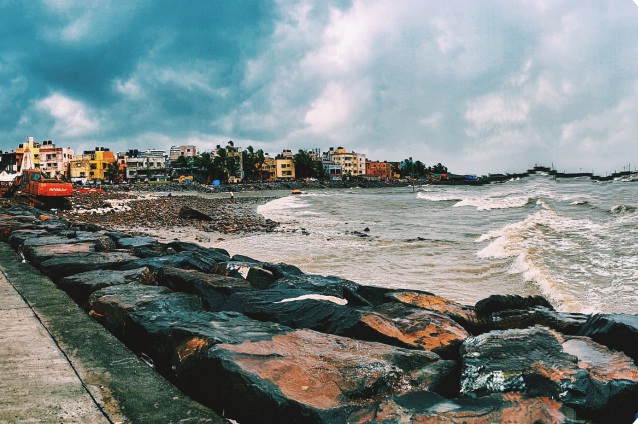Mumbai sets an ambitious goal to achieve net-zero by 2050

Mumbai, 12th March 2022: As the recently published Intergovernmental Panel on Climate Change (IPCC) Working Group II report warns of severe damages from sea-level rise, critically high temperatures and increased risks from climate impacts for coastal cities like Mumbai, the
Brihanmumbai Municipal Corporation (BMC) is committed to building a climate-resilient city.
After a vulnerability assessment, greenhouse gas (GHG) and natural green cover inventory over the last six months, the BMC with technical support from the World Resources Institute (WRI) India and
the C40 Cities network, on Sunday inaugurated Mumbai’s first Climate Action Plan (MCAP), a policy document to adopt an evidence-based planning approach and mobilize resources to move from
action planning to strategic projects.
Uddhav Thackeray, Chief Minister of Maharashtra, said, “While India is on pace to meet its Nationally Determined Contributions, Maharashtra is committed to leading India’s battle against the impending climate crisis through policy-governance changes and instilling the culture of climate
action. The MCAP is designed to fulfil the Paris Agreement’s aim of reducing global warming to 1.5 degrees Celsius. Mumbai will become a climate-resilient metropolis as a result of the evidence-based
policies that led to the creation of MCAP.”
Through the plan, the BMC also has its eyes set on Mumbai achieving net-zero ahead of the Government of India’s deadline of 2070. Achieving a balance between the quantity of greenhouse gas emissions generated and the amount removed from the atmosphere is referred to as net-zero.
This holds significance in light of announcements made by Prime Minister Narendra Modi during the Conference of Parties (COP26) at Glasgow setting a 2070 Net Zero goal for the country.
“Various recent extreme weather disasters in Maharashtra, such as Cyclone Tauktae, urban floods, and untimely rains, have demonstrated the importance of implementing localised mitigation and resilience techniques. Our goal is to urge people to take action on climate change at the local level. In a city like Mumbai, achieving climate resilience requires striking the ideal balance between development aspirations and environmental preservation,” said Aaditya Thackeray, Cabinet Minister
of Environment and Climate Change, Government of Maharashtra.
The pathways scenario exercise under MCAP helps establish an evidence base on which the city can set emissions reduction targets for energy, transport, and waste sectors, which are the major contributors to GHG emissions in the city. While the energy sector accounts for 72% of total
emissions, the transport and waste sector are responsible for 20% and 8% respectively.
MCAP has an overall mitigation goal of attaining net-zero emissions by 2050. The plan’s interim and long-term objectives include a 30% decrease in emissions by 2030, a 44% reduction by 2040, and a
net-zero reduction by 2050 compared to base year emissions (2019). For 2019, the base year emissions were calculated to be 23.42 million tonnes of carbon dioxide emissions (CO2e), or 1.8 tonnes CO2e per person.
According to a future emission analysis under MCAP (divided into three different scenarios), emissions have been predicted to reach 64.8 million tonnes CO2e/year by 2050 under the Business As Usual (BAU) scenario (without mitigation activities), growing 2.7 times between 2019 and 2050.
Emissions are predicted to reach 51.3 million tonnes CO2e/year by 2050 under the Existing and Planned (E&P) scenario, which includes existing local, regional, or national measures, policies, and programmes to decrease emissions. This shows a 119.4% increase above (2019) base year emissions.
An ‘ambitious’ scenario for Mumbai is modelled to set targets of 27% reduction by 2030 and 72% by 2050. This scenario is modelled as ‘ambitious yet achievable’ given the city’s existing developmental
needs and growth trajectory. However, considering India’s recent commitments at COP26, of generating 500 GW of renewable energy by 2050, source 50% of its energy demand from renewables by 2030 and a net-zero target for the country by 2070, Mumbai’s long-term goal of
achieving net-zero are certain.
“There is a 30% gap of ‘residual emissions’, two-thirds of this is dependent on a speedy transition of cooking fuels to electric in all buildings, scientific treatment of wastewater, and protecting and
leveraging the carbon sink potential of our natural ecosystems – mangroves, mud-flats, dense groves of trees, urban forests and our water bodies, While natural ecosystems perform the important function of carbon removal, they also buffer the city from extreme climate risks,” said Lubaina Rangwala, the program head of the urban-development-and-
“The MCAP has set targets that are ambitious, yet inclusive and achievable, acknowledging that 50% of our city lives in informal housing, where a just transition to clean, green, and healthy living conditions
will require big investments, strategic partnerships, and continuous participation with community members,” she added.
MCAP focuses on six sectors in order to provide sector-specific mitigation and adaptation strategies. The MCAP puts emphasis on decarbonizing Mumbai’s energy grid and building energy-efficient and climate-resilient infrastructure under the building energy efficiency theme and promoting low carbon mobility solutions under the sustainable mobility theme, with a strong focus on non-motorized transport infrastructure and zero-emission fuels. MCAP tries to implement a zero-landfill waste management plan under sustainable waste management. Similarly, urban greening and
biodiversity theme will focus on increasing resilience by reducing water-sanitation inequity and adopting nature-based solutions for water conservation and flood risk management, while the urban flooding and water resource management theme will focus on increasing resilience by reducing heat risk and increasing the city’s resilience to flooding events. MCAP envisions reducing air pollution by improving monitoring, enacting effective regulations, and switching to cleaner technologies.
“To guarantee continuity and consistency across outcome indicators and objectives, the six sectoral action plans align with important national programmes and policies such as the National Clean-Air Action Planning (NCAP) standards, the Swachh Bharat Mission targets, and the Climate Smart Cities guidelines,” said IS Chahal, Municipal Commissioner of Mumbai. “MCAP aims to guide the city towards a net-zero future through inclusive, low carbon urban development,” he said.
BMC has committed to three tasks in order to complete all of its commitments to the C40 network as part of the MCAP process. They include the establishment of a climate action cell as a new
department or within an existing Environment department, which will be responsible for implementing MCAP, updating greenhouse gas emissions inventory, climate and air pollution risks, and vulnerability assessments every two years, and revising MCAP every five years.
“BMC has increased its attention on combating climate change and boosting Mumbai’s climate resilience in the face of rising global temperatures and more frequent extreme weather events in
recent decades. MCAP acts as a road map for the city’s policies and activities in response to this serious global and local challenge. The chosen six focus areas of Mumbai CAP are congruent with
India’s commitments towards the Sustainable Development Goals (SDG), such as SDG 11 (Sustainable Cities and Communities) and SDG 13 (Climate Action) amongst others,” said Sanjeev Kumar,
Additional Municipal Commissioner (City), BMC.
C40 evaluated Mumbai’s Climate Action Plan 2022&39; and accompanying documents to its Climate Action Planning Framework and found them to meet their requirement. “The document
demonstrates that Mumbai has thoroughly studied the sources of its greenhouse gas emissions, the effects of climate change on different sectors, communities and areas, the opportunities for climate
change mitigation and adaptation, as well as robust steps towards monitoring implementation,” said Shruti Narayan, Regional Director (South and West Asia), C40 Cities.





